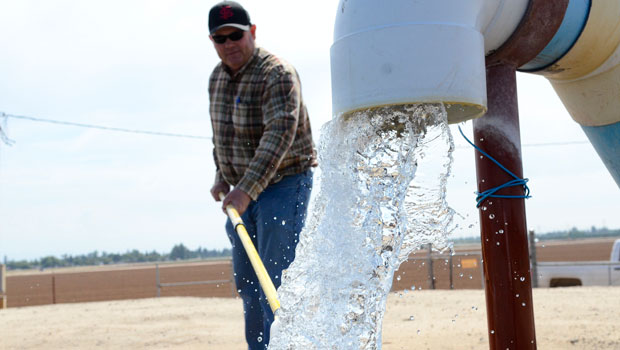The Jordan College of Agricultural Sciences and Technology at Fresno State announced that it expects to reduce water usage by at least 25 percent this year compared to a normal irrigation year for its 1,000-acre campus farm.
Under the leadership of Sandra Witte, interim dean of the Jordan College, and Mark Salwasser, Fresno State farm coordinator, the unit has implemented a host of water management practices to conserve during the ongoing drought.
Among this year’s water management measures, the campus farm expects to:
- leave 130 acres of field crops fallow because of the limited water supply.
- use 20 percent less water than normal on forage crop pastures for Fresno State’s animal units, while pastures with weaker productivity dry up.
- use 10 percent less water in its vegetable unit, vineyards and orchards.
In 2014, campus farm managers initiated many water management changes that resulted in about 20 percent less usage than normal irrigation years.
The Fresno State Center for Irrigation Technology has helped the unit continue to implement more efficient water application and usage. All 410 acres of campus orchards, vegetable units and vineyards now use microsprinklers and drip irrigation after the final 74 acres were converted from flood irrigation in recent years.
Water specialists at the center have also boosted campus irrigation efficiency with new technology such as automated data collection, soil moisture sensors and water flow meters.
“We have completed the mapping of every campus field by crop, soil type and irrigation method to create a master water budget by week,” said David Zoldoske, Center for Irrigation Technology director. “We are constantly partnering with industry to bring the latest technologies to the field. It also serves as a platform to educate our students and Valley farmers how to continue to utilize water more efficiently.”
Fresno State’s 20 agricultural enterprises mirror the diversity of the San Joaquin Valley as the nation’s richest farming area and includes 120 acres of wine, table and raisin grape vineyards, 100 acres of vegetable crops and 190 acres of orchard fruit and nut trees plus a horticulture unit.
The wide range of campus products from the University Agricultural Laboratory are showcased at the Rue and Gwen Gibson Farm Market on campus.
The campus farm also provides the backdrop for 80 classes and employs more than 130 students, while campus water research departments include 20 researchers and 40 student assistants with projects centered both on and off the farm.
“We’re making these changes out of necessity because we don’t have the surface water traditionally available from the Kings River,” Salwasser said. “So, like other Central Valley farmers, we will have to rely more on groundwater. Our farm is a working lab for our students, so it’s important that they be exposed to all types of farming methods. The agriculture industry is constantly responding to new challenges in various forms such as droughts, pests, disease and market changes, and this is an experience that we can all learn from.”





